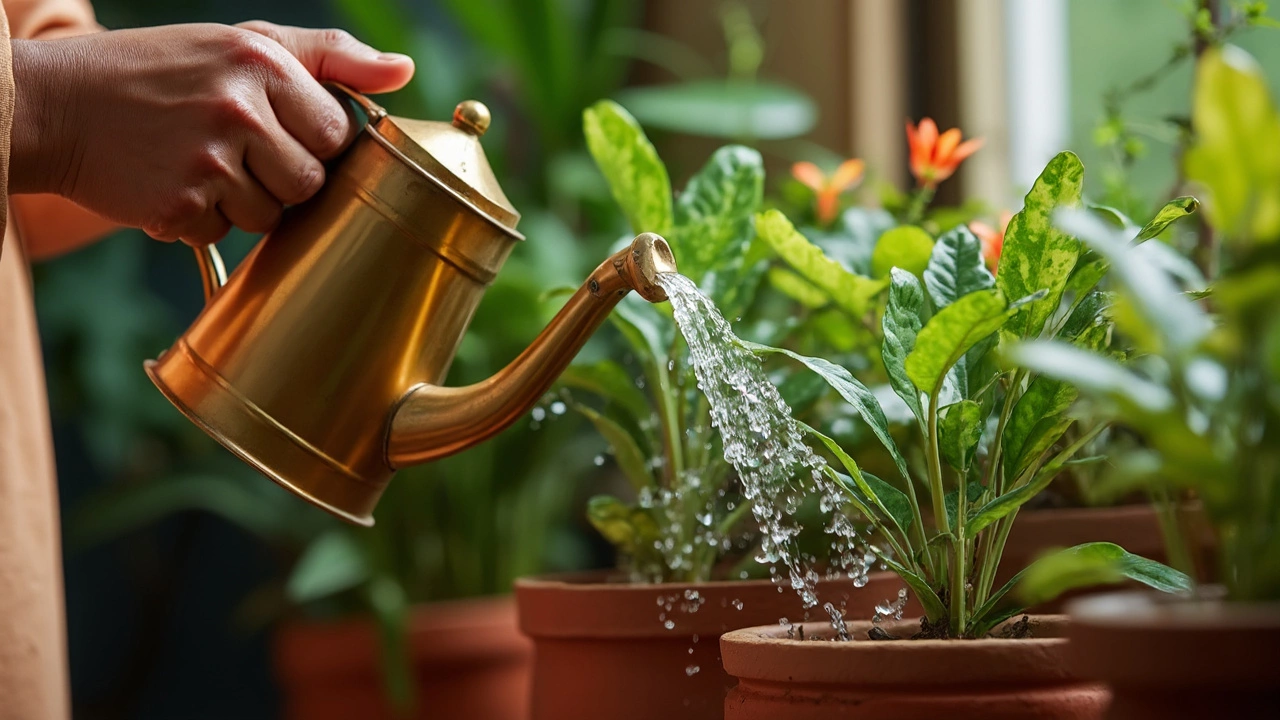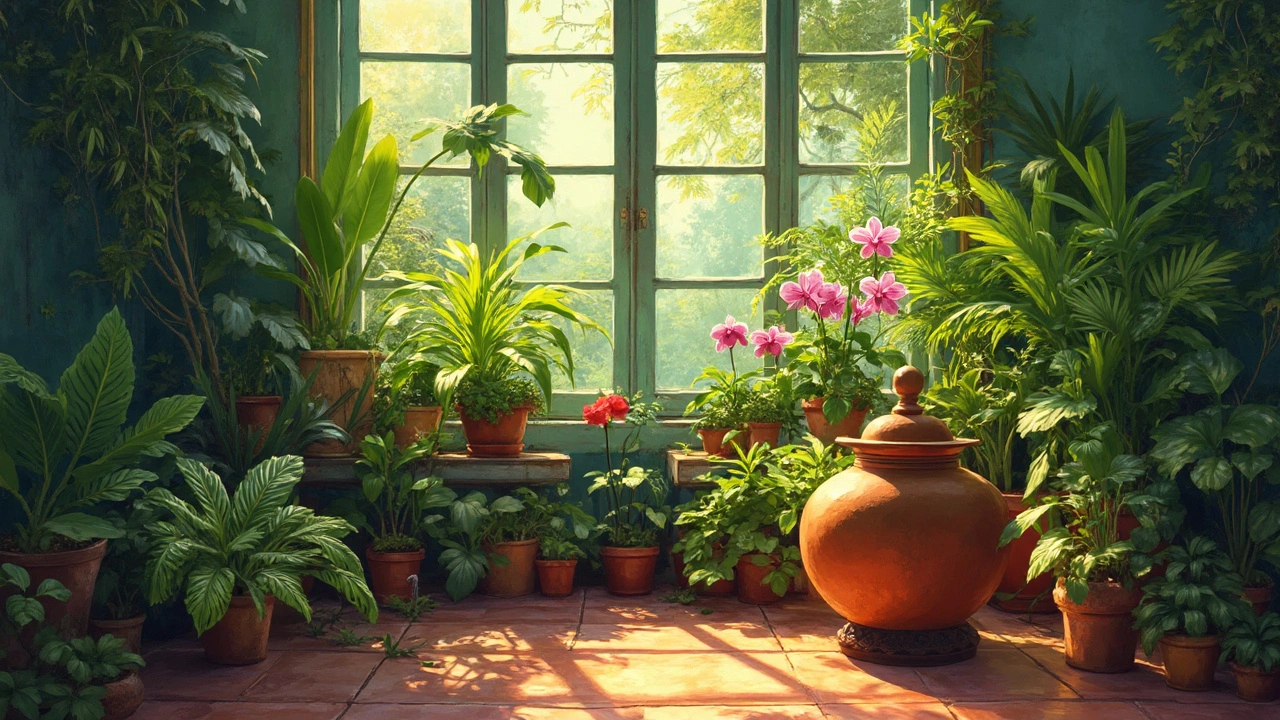Ever wondered if your tap water is the best choice for your beloved leafed friends? It's not such a silly question! Water quality can actually play a big role in the health of your indoor plants. Enter distilled water—a simple alternative that's often considered a game-changer for plant care fans.
Now, you might ask, what's so special about distilled water? Well, it's basically water that's been boiled into vapor and condensed back into liquid in a separate container. Doing this gets rid of impurities and minerals that are usually floating around in regular tap water.
So, is switching to distilled water worth it? Well, it depends. Distilled water can help avoid mineral buildup which is a huge plus for certain plants. But not all plants will enjoy a diet free of natural minerals, since some need those extras to help them grow strong and healthy. Stick around to find out which plants might actually do better with distilled water, and which ones would rather keep life au naturel with their usual tap drink.
- Why Water Quality Matters
- What Is Distilled Water?
- How Distilled Water Affects Plants
- Benefits and Drawbacks of Using Distilled Water
- Types of Plants Suited for Distilled Water
- Alternative Watering Options
Why Water Quality Matters
Let's face it, water isn't just H2O with a splash of magic; it's a huge part of our daily life and, more importantly, our plants' lives. But what makes the type of water you use such a big deal for indoor plants? Well, it all comes down to what's swimming around in there besides plain old water molecules.
Most tap water contains minerals like calcium and magnesium. These minerals, along with chlorine and fluorine added during the purification process, can actually harm your plants over time. Ever noticed a white crusty line on the surface of your soil or plant pots? That's mineral buildup, and it's a red flag.
Mineral Buildup: A Plant's Worst Nightmare
When there's too much of these minerals, they can start accumulating in your plant's soil. This can cause a bit of chaos, making it harder for your plant to absorb nutrients properly. You might spot wilting leaves, yellowing, or stunted growth - none of which scream thriving, right?
Chlorine and Fluorine: The Unwanted Extras
Believe it or not, chlorine, which is meant to make drinking water safer for us, can be toxic to plants when it builds up. Fluorine can hurt certain plants too. For instance, plants like spider plants and dracaenas can get ‘leaf tip burn’ - those brown, crispy edges ruining your plant’s look.
Why Distilled Water Could Be the Superstar
This is where distilled water jumps into action. By removing all those extras through distillation, you get a cleaner, purer water that doesn't overwhelm plants with added minerals. It’s like giving your plants the most refreshing splash of pure cleanliness, helping them to avoid those pesky mineral and chemical problems.
| Water Component | Possible Effects on Plants |
|---|---|
| Calcium and Magnesium | Mineral buildup; nutrient absorption problems |
| Chlorine | Can be toxic; potential leaf damage |
| Fluorine | Leaf tip burn in sensitive plants |
It's worth remembering, though, while distilled water is great for avoiding buildup, it also lacks beneficial minerals that some plants might thrive on. So, balancing is key, and knowing your plants' needs is half the fun of indoor gardening.
What Is Distilled Water?
So, let's talk about distilled water and what makes it so different from the regular stuff that comes out of your tap. Distilled water undergoes a process called distillation, which is all about boiling water into steam and then cooling it down to turn it back into liquid. Pretty cool, right? This process removes contaminants and dissolved minerals, leaving you with just pure H2O.
Now, you might think, 'Why bother removing minerals? Aren't they good?' Well, it depends. Some plants are sensitive to the minerals and chemicals often found in tap water, like chlorine, fluoride, and other salts. These can build up in the soil and cause problems over time, especially with indoor plants.
How It's Made
The distillation process is like nature's own water cycle, just sped up. Here's how it works:
- Water is heated to boiling, turning into steam.
- The steam rises, leaving behind any impurities and minerals.
- That steam is then cooled and condensed back into liquid form.
- The result? Clean, mineral-free distilled water.
Why Use Distilled Water?
Now, why should you consider using distilled water for your plants? For starters, if you have a plant that’s sensitive to salts or if you’re dealing with hard water issues, distilled water could make your life a lot easier. It's also a go-to option for those looking to avoid any chemicals present in municipal water supplies, like chlorine or chloramine.
One fun fact: even though distilled water is devoid of minerals, it’s a popular choice for steam irons and car batteries, too, because it doesn’t leave any residue. But for plants, it's all about keeping those sneaky built-up minerals away from your soil.
So, while it takes a bit more effort to get ahold of distilled water, it can make a big difference for certain plants, particularly if you're noticing leaf burn or other weird symptoms that might be traced back to your tap water.
How Distilled Water Affects Plants
When it comes to watering your indoor plants, the type of water you use can have quite an impact. So, what does distilled water do to your plants? For starters, distilled water is free of impurities and minerals. That might sound like a good thing, but it's a bit of a mixed bag.
Pros of Using Distilled Water
One of the big “pros” is that distilled water doesn't contain any salts or heavy metals that can sometimes build up in the soil over time. This makes it perfect for plants that are sensitive to such elements. As John Smith, a leading botanist, puts it,
“Distilled water is ideal for delicate plant species prone to mineral damage.”
If you're growing orchids or certain tropical plants, they may actually appreciate the purity. Another plus? Chlorine found in tap water can sometimes cause leaves to brown, so using distilled water can help avoid this issue.
Cons of Using Distilled Water
But here's the rub. While getting rid of bad stuff, distilled water also lacks beneficial minerals that some plants thrive on. Elements like calcium and magnesium in tap water can be beneficial.
Imagine watering your basil or tomato plants with nothing but distilled water. You might notice they're not as perky. Plants need a bit of everything to stay healthy, and while distilled water is safe, you could be missing out on some nutrients.
Remember Your Plant's Needs
Not all plants respond the same way, so it helps to know what your green buddies prefer. Indoor plants like succulents can do just fine with tap or distilled water while other thirsty plants might show improvement when distilled is used sparingly alongside nutrient boosts.
So, don’t ditch your tap water just yet. Consider a mixed approach to keep your plants happy and leafy. It's all about balance!

Benefits and Drawbacks of Using Distilled Water
When it comes to caring for your indoor plants, the type of water you use can be a bit of a game-changer. Choosing distilled water over tap water has its pros and cons. So, let's dive into what you might gain or lose by opting for this purified version.
Benefits of Using Distilled Water
First off, one of the biggest perks of using distilled water is its purity. It’s free from minerals, chemicals, and impurities that can often be found in tap water. This means fewer chances of getting those pesky mineral deposits on your plant's soil or leaves. For plants that are sensitive to high mineral content, distilled water can be a real blessing.
Another advantage is that it helps prevent chlorine and fluoride stress. Some plants don't do well with these chemicals, which are commonly found in tap water. Distilled water eliminates this issue entirely, keeping your plants happier and healthier.
Drawbacks of Using Distilled Water
On the flip side, distilled water lacks the minerals that some plants thrive on. While this isn't a big deal for all plants, those that like a bit of calcium or magnesium might not be so keen on the distilled version. This could mean you'll need to supplement these nutrients through other means, like fertilizers or soil amendments.
There's also the cost factor. Since you can't just turn on a tap for distilled water, you'll either need to buy it or make it yourself, which can add up over time.
If you're wondering whether distilled water makes a big difference, it might be worth trying an experiment. Consider watering a couple of plants with distilled and the others with tap, then just watch how they do over a few weeks.
Types of Plants Suited for Distilled Water
When it comes to choosing the right water for your indoor garden, some plants are actually more suited for distilled water than others. The absence of minerals in distilled water can be beneficial for particular greenery, ensuring they don’t get stressed by the stuff lurking in tap water.
Orchids
Orchids are pretty popular and they thrive on distilled water. These tropical beauties are sensitive to the salts and chemicals found in tap water. By using distilled water, you’re less likely to see those dreaded brown leaf tips, a sign of mineral accumulation.
Carnivorous Plants
Plants like Venus flytraps and pitcher plants hail from environments where rainwater rules, meaning their natural habitat is low in dissolved minerals. Giving them distilled water mimics their home turf more closely, and keeps them healthier in the long run.
Ferns
If you’ve got ferns, you’ll know they love humidity and hate the chlorine that often comes in tap water. Distilled water is free from such additives, which makes it an excellent choice to keep those fronds lush and green.
Why Not All Plants?
But hey, not every plant is into the mineral-free water scene. Some, like succulents, appreciate the minerals found in tap water to some extent. So, before you decide, take a peek at what your plant babies actually need. A little research could save you a lot of heartache.
So, that's a quick look at some ideal indoor candidates for distilled water care. Try switching up the routine for these specific plants and see if distilled makes a difference!
Alternative Watering Options
If you're considering shaking things up from the usual distilled water routine or just want to be kinder to your wallet, there's a buffet of other choices you might not have thought about. Let's dive into these options and see which ones could be a perfect fit for your green pals.
Rainwater: The Natural Sipper
Hands down, rainwater is like nature’s own plant cocktail, packing no added chemicals or salts you often find in tap water. If you've got the chance to collect some, your indoor plants might seriously thank you. Plus, it's free, making it a win on all fronts.
Filtered Tap Water: A Hassle-Free Alternative
Maybe you have a water filter at home, like a pitcher or tap attachment. Filtered tap water can remove a bunch of the harmful chemicals, keeping only what's good for your plant babies. This effort gives you water that's almost as good as distilled but without the extra run to the store.
Aquarium Water: Fishy Fresh
Got a fish tank at home? Aquarium water after a change is loaded with beneficial bacteria and nutrients. But a word to the wise—don’t use saltwater from marine tanks; fresh is the way to go.
Bottled Spring Water: A Splurge Option
Okay, maybe this isn't the most wallet-friendly choice, but bottled spring water can be a cool change every once in a while! It has minerals present in amounts that suit most plants.
These alternatives not only offer different ways to keep your leafy friends happy, but they can also be a lot less harsh on the environment. So, next time you're thinking of trying something new, remember these options and see how your plants flourish!

